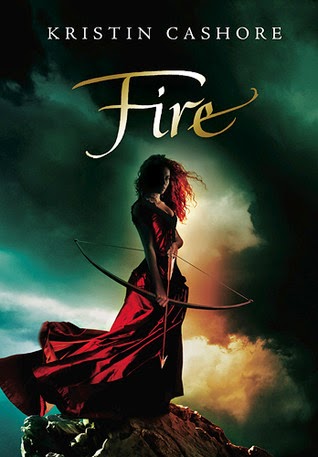Today in A Fantasy Alphabet we arrive at the letter F. F is for Fire, by Kristin Cashore.
I read this when it first came out, and remember being lukewarm about it, but on rereading it for this series, I think that was because I wanted more of the story we got in Graceling, her first book, whereas Fire heads off in a different direction with a new set of characters, though rather loosely set in the same world.
On rereading for this series I see much to admire in the story of Fire, a human “monster” in a world where brightly coloured versions of normal creatures are insanely seductive to others, and are known as monsters. Fire’s allure is so extreme she can’t even look at herself in a mirror, as she too feels the pull of her unnatural beauty.
Everyone wants to either kill her or kiss her, and her whole life revolves around dealing with other people’s perception of her and trying to mitigate the danger to herself and others. She is seen, particularly by men, as a thing to be possessed, not a person. Hers is an extreme case, but I can see parallels with the life of even ordinary women, ever-conscious of the male gaze and its effects, how society insists on defining women as women first and anything else second, whatever their achievements.
Fire’s case could be read as an interesting metaphor for that, but this is only one of the issues Fire must grapple with. As a monster, she also has powers to coerce people to do her will, which her dead monster father used to devastating effect. Fire is terrified she too will turn out like him, a “monster” in the true sense of the word.
When Fire is forced to travel to the capital city she becomes enmeshed in the affairs of the royal family, who are working desperately to stave off civil war. The weak young king is drawn in by her beauty; his brother Prince Brigan at first despises Fire, because of the association with her father, who aided and abetted the previous king in his atrocities. Yet Fire feels a growing attraction to the prince.
But there’s little time to consider romance, whatever her heart tells her, with spies to interrogate, a civil war to avert, and many personal revelations. Fire learns that little in life is black and white, as she grapples with difficult moral questions. Is it right to use her powers, which might be considered evil (and were often used for evil by her father) if she uses them for good, to try to save the kingdom? Or does that still make her a monster? How far can she go and still live with herself? On the other hand, can she live with herself if she doesn’t use her unique abilities to save lives and help the people she cares about? She’s also concerned with questions of free will and destiny. Does her genetic heritage define her, or can she be her own person by making different decisions to those her father made? Can she atone for her father’s atrocities by her own sacrifice?
If I’m making it sound as if the book is all about debates on morality, don’t worry, there’s plenty of plot too, and some great characters. In fact the only character I could complain about is Brigan himself – he’s just too damned perfect. I love him – but the guy has absolutely no flaws, unlike nearly everyone else in the cast, who are more nuanced and believably human.
But the fact that the leading man is so wonderful is hardly a turn-off, and there’s plenty of crunchy philosophical questions to consider if a fast-moving plot isn’t enough of an enticement. I’m going to give it to my daughters to read. A very thoughtful book.





